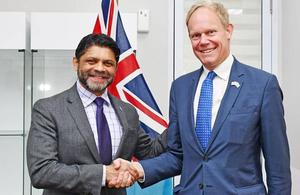Regulators urge safe giving to support Pakistan flood relief
The Charity Commission and Fundraising Regulator have urged the public to ‘give safely’ to registered charities as people make generous donations to causes helping to support people affected by the floods in Pakistan.
This follows the launch of the Disasters Emergency Committee (DEC) Pakistan Floods Appeal. The DEC brings together 15 leading UK aid charities to raise funds quickly and efficiently at times of crisis.
The Appeal, launched by the DEC on 1 September 2022, aims to help millions across Pakistan who are in need of immediate help to survive after devastating floods hit the country.
Many registered charities are also helping to provide vital life-saving services, like water, food and healthcare, to those affected by the floods.
By supporting registered charities, including through the DEC, the public can be assured that their donations will be regulated in line with the charity law framework.
Established charities with experience of responding to disasters are usually best placed to reach people on the ground. Giving financial aid through humanitarian aid organisations, rather than sending donated goods directly to regions, is also often more practical and sustainable.
Helen Stephenson, Chief Executive of the Charity Commission said:
We’ve all watched in horror as the crisis has unfolded in Pakistan and we know that many people in the UK will want to help the international aid effort. We encourage everyone to follow our simple steps to check that their money gets to its intended cause. Donating to a registered charity is a good way to feel confident of that.
Gerald Oppenheim, Chief Executive of the Fundraising Regulator said:
The ongoing crisis in Pakistan is devastating. Naturally, the goodwill of the British public means many will be eager to support those affected where they can. Before donating goods or money, it is important that people carry out our recommended checks to make sure they are giving to a legitimate cause and that their donations are used for the purpose they were fundraised for.
While most fundraising is genuine, the Charity Commission and Fundraising Regulator warn that fraudsters and criminals sometimes take advantage of public generosity at times of increased giving. This includes using various methods such as fake appeal websites, email appeals that falsely use the name of genuine charities, or appeals from groups claiming to be charities.
They therefore encourage people to ensure they support genuine relief efforts by following a few simple steps before giving:
- check the charity’s name and registration number on the Charity Register at gov.uk/checkcharity – most charities with an annual income of £5,000 or more must be registered.
- make sure the charity is genuine before giving any financial information.
- be careful when responding to emails or clicking on links within them.
- look out for the Fundraising Badge – the logo that says ‘registered with Fundraising Regulator’ – and check the Fundraising Regulator’s Directory of organisations which have committed to fundraise in line with the Code of Fundraising Practice.
There are over 1900 charities on the Charity Commission’s charity register that list Pakistan as an area they work in overseas.
After making these checks:
- If you think that a collection or appeal is not legitimate, report it to the police. If you think the collection is fraudulent report it to Action Fraud over the phone at 0300 123 2040 or online.
- If you think a collector does not have a licence – report it to the relevant Local Authority Licensing Team or the Metropolitan Police (if in Greater London). Also let the charity know if you can.
You can also complain about a charity to the Charity Commission if you have concerns about its governance and the Fundraising Regulator if you have concerns about its fundraising.
ENDS
Notes to editors:
Press office
- Further tips on giving safely to registered charities are available on GOV.UK
- The Charity Commission is the independent, non-ministerial government department that registers and regulates charities in England and Wales. Its purpose is to ensure charity can thrive and inspire trust so that people can improve lives and strengthen society.
- The Fundraising Regulator is the independent regulator of charitable fundraising in England, Wales and Northern Ireland. Further guidance on giving safely to charity is available on the Fundraising Regulator’s website. It can be reached on FR@pagefield.co.uk

